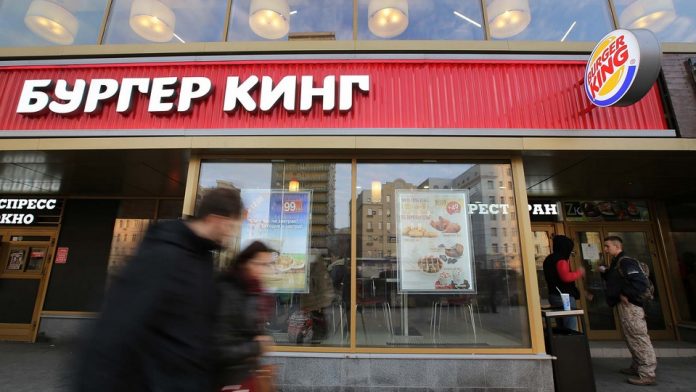Burger King holds a quiet stake in its Russian franchisee even as it publicly distances itself, leaked records show
The fast-food giant is a partner in a Cyprus-registered joint venture with VTB Bank, known as Putin’s “piggy bank,” that shuffled money to and from an anonymous shell company in Seychelles.
Even as Burger King publicly cuts off support to its Russian operation, the fast-food giant has quietly kept a stake in it through an offshore joint venture, leaked documents show.
Burger King’s parent company, Toronto-based Restaurant Brands International Inc., acknowledged the stake after the International Consortium of Investigative Journalists sent questions about its Russian holdings. It then announced it is trying to sell the shares but said it can’t be done quickly.
The company owns its stake through a Cyprus-registered joint venture that includes VTB Bank, a sanctioned, state-owned Russian bank, and a Ukrainian investment firm that Kyiv prosecutors once accused of helping Ukraine’s extravagantly corrupt former leader.
Another shareholder was a Cypriot company belonging to Alexander Kolobov, a Russian restaurant mogul who runs Burger King’s operations in the country.
The documents, leaked to ICIJ as part of the 2021 Pandora Papers project, show that all four shareholders of the joint venture owned their stakes at times through shell companies in tax havens.
The documents also reveal that the Cyprus joint venture previously made a loan to, and received a $1 million payment from, an anonymous shell company registered in the Seychelles, one of the most notoriously secretive jurisdictions in the offshore system.
After ICIJ sent questions about its Russian operations last week, Restaurant Brands International posted a statement on its website saying it wants to sell its stake in the business.
“While we would like to do this immediately, it is clear that it will take some time to do so based on the terms of our existing joint venture agreement,” the statement said.
In an emailed response to ICIJ, the company said, “We have asked the master franchisee to suspend the Russian business with immediate effect. They have refused and due to the franchise structure and current agreements, we do not have the ability to force them to close.”
The leaked records show that the joint venture, Burger King Russia Ltd., partly owns the Russian franchisee, Burger Rus LLC. The Toronto-based parent company said it has no control over it.
The revelations of Burger King’s quiet equity stake compounds the fast-food giant’s complications in the Russian market. While rival McDonald’s and other fast-food multinationals have ceased operations in the country in response to Russia’s invasion of Ukraine, Restaurant Brands International says it can’t do the same due to its “fully franchised” Russian operations. It has instead suspended “corporate support” for the restaurants and redirected profits from its 800 Russian outlets to Ukrainian refugee relief efforts.
Burger King owns its 15% stake in the Cyprus joint venture, Burger King Russia, through a European unit, based in Switzerland.
Another shareholder, Investment Capital Ukraine (ICU) owned its 35% stake in Burger King Russia through another Cyprus-registered firm, according to the records. ICU announced plans to sell its stake on March 5.
“Given the current situation, ICU has concluded that we will be exiting Russian investments,” a spokesperson told ICIJ.
The sanctioned VTB Bank, Russia’s second largest, had owned its stake in the joint venture through a company registered in the tax haven of Guernsey, an island in the English Channel. The Pandora Papers show VTB, known as Russian President Vladimir Putin’s “piggy bank,” later transferred the stake to a Russian-registered company. Cyprus’ registry data shows the VTB-controlled company holds about 20% of the joint venture.
The leaked documents illustrate the political and financial perils Western multinationals face when investing in the Russian market, where rule of law is weak and corporate transparency hard to come by. They describe how Burger King’s Russian operations started and thrived, thanks to its partnership with shell companies in shadowy offshore jurisdictions. They also show the complexity of business deals that rely on politically connected partners like VTB, the state-owned bank whose role is to connect Russia to international markets.
Burger King’s partnership with VTB puts the fast-food chain into a “very difficult place” because the U.S. issued “full blocking sanctions” against the bank, said Maria Snegovaya, a Russian political scientist and visiting scholar at George Washington University.
“VTB can provide really great credit conditions for the company so they get a lot of money to invest to grow their business,” Snegovaya said. But it also “makes it more dependent on the Kremlin.”
VTB did not respond to ICIJ’s questions about the joint venture.
